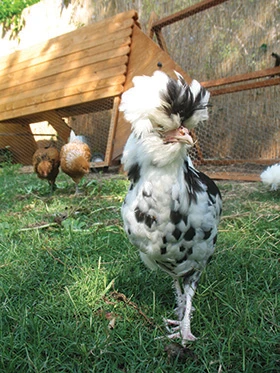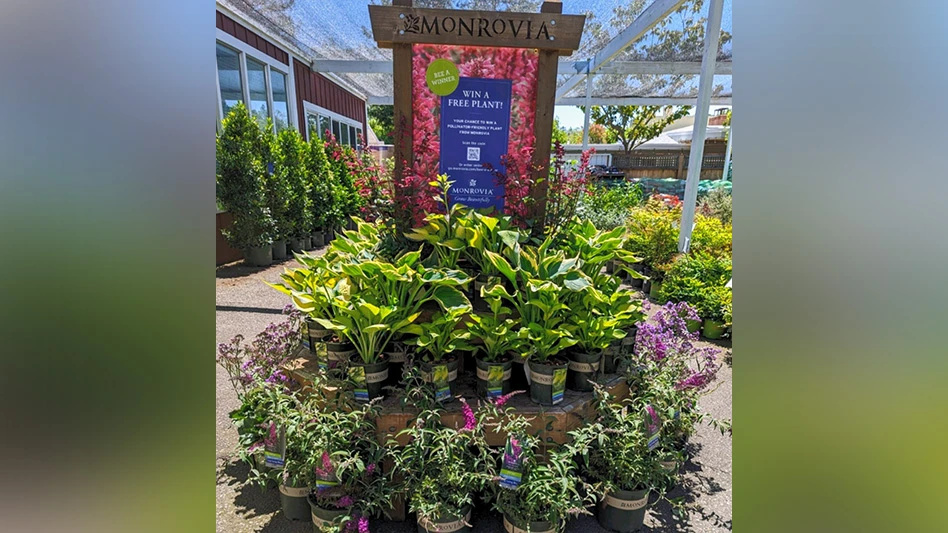
 The question du jour for most independent garden centers is “how do we get younger and new gardeners into our store?” A common answer is to connect gardening to food and you’ll be able to grab their attention. While I do think that is true for many reasons, we have to take a step beyond simply connecting food to gardening; we must also empower our potential customers to make that connection for themselves. What better way to do that than help them bring livestock into their garden?
The question du jour for most independent garden centers is “how do we get younger and new gardeners into our store?” A common answer is to connect gardening to food and you’ll be able to grab their attention. While I do think that is true for many reasons, we have to take a step beyond simply connecting food to gardening; we must also empower our potential customers to make that connection for themselves. What better way to do that than help them bring livestock into their garden?
Chicken or garden: Which came first?
People who love gardening, or who have the potential to love gardening, tend to be the sort of folks who enjoy cultivating, caring for and creating things. I often call houseplants the “gateway drug to gardening,” as they were for me. However, over the last few years I’ve seen backyard chicken keeping act as an equally potent catalyst for an interest in gardening. It stems from wanting that closer connection to our food. Knowing exactly where your food comes from is comforting; knowing how your food is treated while it’s alive is even better. It’s also a great hobby if you have young children and it helps expose them to gardening at a young age.
Keeping backyard chickens in the city isn’t exactly a new trend anymore. But newbie vegetable gardeners are still coming out of the woodwork and the backyard chicken movement continues to gain momentum. Vegetable gardening, composting and raising small livestock can be vital components of a healthy, sustainable lifestyle. Garden centers are the perfect venue to offer this complete package, so why not take advantage of the opportunity?
Ruffle some feathers
When I dove head first into the business of backyard chicken keeping at North Haven Gardens back in 2009, it caused quite the kerfuffle in our affluent Dallas neighborhood. But at a time of grand economic recession, we needed to stay ahead of trends and provide excitement to keep traffic (and cash) flowing. And boy did we! I found myself at a table with 13 different top Dallas city officials, including two of their lawyers, defending our chicken business. But the Dallas Morning News and multiple TV stations were also following me around, so the press was fantastic. Needless to say, there weren’t enough parking spaces to accommodate the traffic we received for our programs and sales. To this day, it’s still one of the most popular draws at the garden center.
 Bottom line, you have to know your local laws and ordinances first. I’d crossed all my t’s and dotted all my i’s before I wrangled with the city. Ultimately we were allowed to go about our business unfettered. But not all cities allow homeowners to keep backyard chickens, or allow businesses to sell them. Many cities limit the practice with different restrictive ordinances. Make sure you’re a good steward of those ordinances so you can operate legally and help your customers stay in compliance.
Bottom line, you have to know your local laws and ordinances first. I’d crossed all my t’s and dotted all my i’s before I wrangled with the city. Ultimately we were allowed to go about our business unfettered. But not all cities allow homeowners to keep backyard chickens, or allow businesses to sell them. Many cities limit the practice with different restrictive ordinances. Make sure you’re a good steward of those ordinances so you can operate legally and help your customers stay in compliance.
Birds: to sell or not to sell?
While we did set up a coop with 8 to10 birds for display and offer egg sales at the garden center, I didn’t want to be in the business of actually raising and caring for young livestock for sale. I suspect many other garden centers have avoided the category for the same reason. My solution was to set up a partnership with a rural chicken breeder. Once per month, our “farm partner” would truck in a trailer of pullets (juvenile hens), between the ages 9 to 18 weeks, all pre-vaccinated. Dallas’ ordinance prohibits roosters so this arrangement also helped keep us in compliance. Our breeder offered assorted standard breeds and some fun specialty breeds. He sold his birds directly to our customers, along with programs and Q & A time, while we carried all the supplies for chicken keeping in the garden center. Definitely a win/win for all involved. These kinds of events are highly promotable and drive lots of traffic.
Depending on your particular circumstances, you may be able to handle selling baby chicks. You can now access chicks and a plethora of supplies through buying co-ops like True Value. Just be aware that depending on your local ordinances, you may need the ability to offer pre-sexed chicks (younger chicks whose sex has already been determined by a more expensive method) at a higher cost. You’ll also need to have someone responsible for supervising the live animals, as they require special care and lots of little hands will be reaching into their pen every day.
Niche supplies as season-extenders
The next step to making a successful foray into the backyard chicken business is to choose the right supplies to sell. That will depend on how many feed stores already operate in your area. If you don’t have any nearby feed stores, then you can expand your selection and be the “go-to” location for supplies. If you do have surrounding feed stores, look at providing some specialty items they may not carry.
|
A note about selling eggs These eggs were supplied from our garden center chickens that were housed on the property. Because of our certificate of occupancy, we were allowed to produce vegetables and small livestock and sell the produce on property. Texas state laws allowed us to sell our eggs directly to the customer without any special legalese/labeling, as long as they didn't first go to a distributor. They had to be direct from the chicken to the customer! But again, everyone needs to check and double check their local laws, zoning, certificate of occupancy, etc. as to what they are/aren’t allowed to do in regards to those issues. |
Start with the basics such as chicken feed (conventional & organic), scratch, feeders, water containers, hay bales for bedding, how-to books and food grade diatomaceous earth. This will get the new chicken keeper started. The nice thing about selling chicken feed is that folks have to come in to the garden center year-round to buy it, which is great for driving traffic during slower gardening times.
Once you get things rolling successfully, look into specialty items such as oyster shells, grit, electrolyte supplements (great for hot climates), egg-cleaning wipes, mite treatments, nesting boxes, heat lamps, incubators and even custom coops.
Retail chicken coops are still an emerging product, meaning it can still be a little tricky to find affordable, quality coops at wholesale for you to re-sell profitably to your customer. Most are small and accommodate only a few birds; plus most of the manufacturers are already selling them online.
However, you may have a local carpenter who has gotten into the business of custom coops. Commissioning them to build larger or custom coops for you, or even consigning their coops, can be a good solution.
Education keeps customers coming back
Be sure you have staff who understand the intricacies of backyard chicken keeping, so that you can responsibly teach your customers how to care for their livestock. It’s always best if you already have at least one chicken keeper on staff. Keeping livestock should not be taken lightly: Owners will have to deal with health issues and attrition in their flocks. That means they have to be prepared for how to put down birds when it’s necessary. Health and bio-security are important topics so make sure to read up on these issues. Gail Damerow has two fantastic books I’d recommend:
“Backyard Chicken Keeping” and “Chicken Health.” Both are great sellers at retail as well.
Invite seasoned chicken farmers and breeders to come in to do educational programs for your customers. We hosted monthly meetings for the Dallas Backyard Poultry Meet-Up group that covered topics ranging from raising your own chicks to butchering birds.
Our experienced staff gave regular programs on chicken keeping 101. Keeping livestock is a long-term commitment so providing on-going education can keep your customer traffic flowing for years to come.
Leslie Finical Halleck owns Halleck Horticultural, LLC, through which she provides horticultural marketing, business consulting, social media management and content generation for green industry businesses. Leslie is a Certified Professional Horticulturist (CPH) via ASHS, with more than 20 years of industry experience. For the past eight years she served as General Manager for North Haven Gardens, a well-respected independent garden center in Dallas, Texas. www.lesliehalleck.com
All photos courtesy of Leslie Finical Halleck
HEAR MORE about backyard chicken keeping from Leslie in the Backyard chicken keeping podcast here. To hear more podcasts, download the Retailer Radio Network podcast station on iTunes here.

Explore the January 2014 Issue
Check out more from this issue and find your next story to read.
Latest from Garden Center
- This Florida garden center's busiest days are in the fall, not spring. Find out how they do it
- Terra Nova Nurseries releases new agastache variety, 'Peach Pearl'
- The Certified Shopify Online Garden Center provides local retailers with ecommerce tool
- Meet the All-America Selections AAS winners for 2025
- Endless Summer hydrangeas and Suntory Senetti glam up Grammys red carpet
- Ball Seed releases 2025 edition of 'Thrive and Flourish' for landscape and garden retail
- American Floral Endowment's Fred C. Gloeckner Foundation Research Fund accepting grant proposals
- Floral Marketing Fund and CalFlowers partner to advance floral industry





